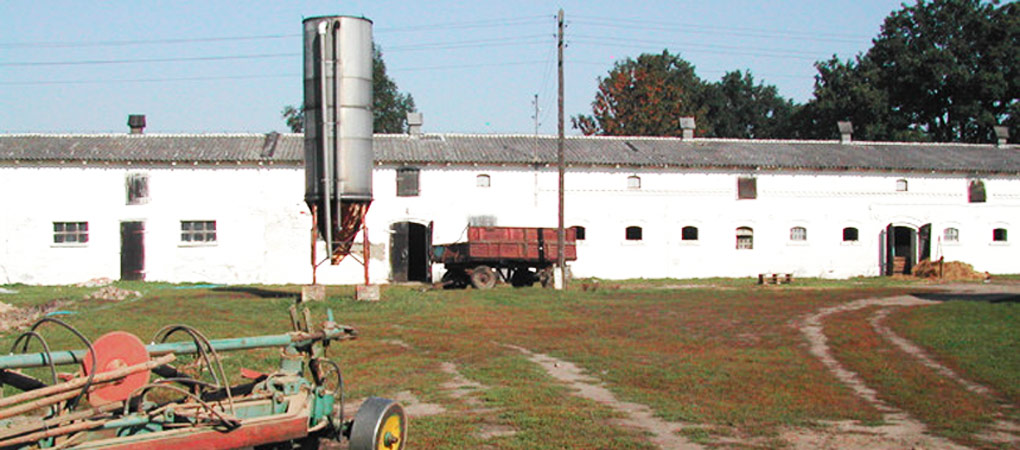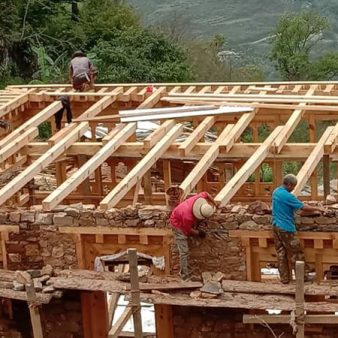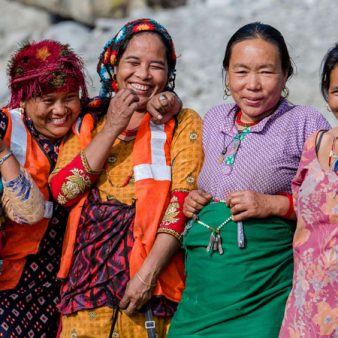The revitalisation of neglected and bankrupt former state farms and apartment blocks enables the Barka Foundation to offer homes to 650 socially excluded persons in communities, hostels, private flats and single family houses. Opportunities for income generation and training enable the residents to rejoin mainstream society. Social help is linked with environmental protection and rare pig and fruit tree farming provides income as well as protecting biodiversity.
Project Description
Aims and Objectives
- To house, support and train destitute people in rural areas of Poland in a socially, economically and environmentally sustainable manner.
- To create conditions to make subsistence a possibility for the socially excluded, through common efforts aimed at rescuing people and the environment.
- To cultivate unfertile and neglected land and introduce rare races of animals and species of plants that are near extinction.
There is large-scale dereliction in the rural areas of Poland where Barka is working, with many thousands of hectares of land uncultivated and neglected. Buildings have likewise been abandoned and many are now derelict. This is a result of the fact that the former state farm complexes have gone bankrupt with the collapse of the communist bloc in the early 1990s. Officially there are said to be over 300,000 homeless people in Poland, although unofficial estimates put this at nearer one million.
The market reforms introduced in the last decade have created a new type of extreme poverty and acute social vulnerability. There is a high and increasing unemployment rate (20 per cent plus) with 50 per cent of the population living on minimum wage levels. There are no government programmes designed to help those living in rural areas. The main housing problems to overcome are homelessness and an overall shortage of dwellings, high unemployment rates, lack of basic structures to undertake individual enterprises, and low educational levels and social stagnation.
The Building Partnership to Eradicate Poverty project includes a wide range of many elements, all with the purpose of helping the most destitute persons and families and promoting social integration. From 1990 to 1995 its work involved establishing communities in rural homesteads and small-scale farms and bringing them back into use. It currently administers 30 houses, including community houses, hostels, socio-educational centres and emerging social cooperatives. The project currently offers housing to approximately 650 persons (in communities, hostels, private flats and one-family houses). Crisis centres are opened in winter for those on the street.
In 1995 Barka Foundation took on a large challenge in the form of an ex-government agricultural complex with two abandoned and incomplete apartment blocks. These were purchased and restored using the labour of 50 people living in the commune and grant aid from a range of sources.
In 1997 the Barka Foundation purchased a historically significant manor house in need of complete restoration, together with its associated park. The old manor is now completely renovated inside and is used as a co-operation centre where conferences, seminars and workshops are organised for exchange of experiences among diverse Western and Eastern European organisations working with the poorest people in society. The outbuildings have been restored to provide workshops, storage and sanitary facilities for the planned summer camps. In 1999 a further 400 ha of land with the old farm buildings of a former State farm complex were rented. The buildings are now partly restored providing 20 permanent homes and two flats for short-term letting.
Homeless persons, long-term unemployed, former prisoners, orphans, drug addicts and socially disabled people live and work in the communities. A range of income generating projects involved with biodiversity protection, cultural heritage, conservation and environmental protection are being undertaken. Poor families in the locality are also assisted with meals, food, clothing and household appliances.
The costs of the project are met by United Nations Development Programme (UNDP) funding and donor aid from the Netherlands. Grant aid and small private donations of goods and money are also used to meet the everyday costs of everyday running the project.
Plans for the future include the construction of a canteen, provision of a drug addition therapy centre and a programme of herb cultivation and a housing settlement of 400-500 houses. Pilot homes have already been built using low-cost building technologies such as bricks made of clay and straw.
Why is it innovative?
- Revitalisation of neglected and bankrupt former state farms and apartment blocks.
- Creation of places to live and work for socially excluded persons.
- Restoration of people to mainstream society who had previously been on the margins.
- Encouraging biodiversity through the reestablishment of ancient pig breeds and fruit trees.
- Creation of a centre for exchange of information and dissemination.
What is the environmental impact?
Reconstruction has been carried out using conventional materials.
The implementation of the biomass heating system in the Old Manor House gives a reduction in air pollution compared to the previous sulphurous coal-fired system (reductions in emissions of sulphur dioxide of 90 per cent, of nitrogen dioxide of 60 per cent, of carbon monoxide of 15 per cent, 50 per cent less dust and 100 per cent less soot). Sustainable willow plantations provide the fuel. Barka intends to build similar boiler plants in its community houses and is promoting the transfer from coal or oil-fired boilers in all areas near forests and sawmills.
Is it financially sustainable?
The community seeks to be financially independent. The income to run the houses comes from economic agricultural activities and services offered to the residents. Those residents who have a steady income pay rent. Those who do not earn an income contribute their labour.
What is the social impact?
Local communities are involved with the Barka projects and those in need locally are supported by them. Capacity building and training and skilling programmes are all part of the mutual self-help programmes run by Barka which serve to improve the ability of people to participate in their community’s life and decision-taking processes. Agricultural training on organic principles is provided to internationally recognised standards.
Partnership
NGO, local community, international agency



